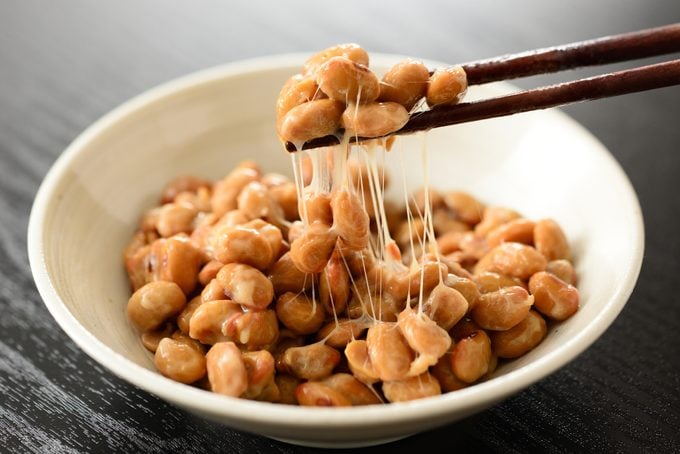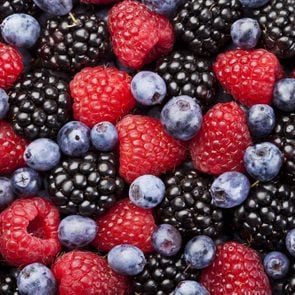Nattokinase Benefits: 6 Reasons To Try This Asian Superfood (Plus, a Chef’s Tips)
Updated: Mar. 08, 2022
Love Asian food? Introducing natto. This fermented goodness may be unfamiliar—but with these benefits to your heart, brain health, and more, well... maybe it's time to give natto a try.
What is natto?
Natto is a traditional Japanese food with a history as unique as its sticky texture. Pronounced phonetically—short A, stress on the first syllable—natto is a dish made of boiled soybeans that are left to ferment in a hot, humid environment for about 24 hours. This results in a distinctively pungent culinary staple with some impressive creds for your health.
According to Japanese legend, natto’s fermentation process first came about by accident. There are a few different versions of the history, but one consistent detail suggests that around a thousand years ago, a famous samurai placed cooked soybeans in a straw sack on the back of his horse. Story has it the heat from the horse’s body triggered fermentation. Other theories say natto was discovered when cooked soybeans gathered beneath kitchen mats, or when farmers hurriedly packed up soybeans to flee during wartime.
No matter which natto narrative you subscribe to, the experience is likely the same: A gooey, rich, aromatic dish that became a popular breakfast food sold by street vendors—and, over time, an important feature of Japanese folk medicine. When you learn about natto’s health benefits, you may agree that’s no wonder.
Can natto be made at home?
By the 20th century, researchers identified the specific bacteria (Bacillus subtilis) that’s responsible for natto fermentation. These days, manufacturers package natto starter spores so you can ferment your own soybeans right at home.
How do you make natto? Masatomo “Masa” Hamaya is the executive chef at the Japanese restaurant O-Ku in Atlanta. Chef Masa explains that to make natto, you start by hydrating dry soybeans in water, then steaming them. “While the steamed soybeans are hot, add the fermentation starter or add ready-made, store-bought natto into the steamed soybeans,” he says. “Leave soybeans in the incubator or bread proofer [at] 42 degrees Celsius for 24 hours.”
Natto stands apart from other soy-based products thanks to its characteristic scent, Chef Masa says, and compares the bean dish to the aroma of a stinky cheese like Époisses or Taleggio. And, like the durian fruit of Southeast Asia or Tawain’s stinky tofu, natto is often described as an acquired taste.”I personally grew up eating natto, so I would eat it as is,” Chef Masa says. “But for those who are not used to eating it, I would make [your] favorite bean dish and substitute [the beans] with natto.”
Or, you could take the traditional route, where natto is served as the star ingredient on a bed of rice. It’s also common to add vegetables, scallions, soy sauce, mustard, or kimchi.
What is nattokinase?
Nattokinase is the enzyme produced during soybeans’ fermentation process—and it’s the signature active ingredient in natto. Yiguang Lin, MD, PhD, is a pharmacologist and lecturer at the University of Technology Sydney who has contributed to research on nattokinase published in Biomarker Insights. He explains how the discovery of nattokinase in 1981 made natto’s health benefits more accessible to the general public.
And while this distinct flavor isn’t for everyone, you may be tempted to try it when you learn what nattokinase can do for the body. If you’re looking to work it into your diet, here’s advice from Mary Mosquera-Cochran, a registered dietitian at The Ohio State University Wexner Medical Center: “You can get nattokinase by eating natto itself, and scientists have also figured out how to extract the nattokinase so it can be taken in supplement form,” she says.
The health benefits of nattokinase

In Japanese tradition, eating natto is associated with better heart health and lifespans. Research published in the American Journal of Clinical Nutrition backs up this observational trend, concluding that regular natto consumption significantly decreases the risk of death from cardiovascular disease (CVD).
While he says that much more research is needed, Dr. Lin and his team explored what role the enzyme nattokinase plays in these positive health outcomes. Between their Biomarker Insights findings and other research, here’s what medical and nutrition experts suggest.
Nattokinase health benefit: It may improve blood circulation
In 1980, researchers at the Chicago University Medical School observed natto dissolving blood clots in their lab. The team isolated the enzyme responsible for this anticoagulant activity—to be specific, it was nattokinase—and demonstrated that it can improve blood circulation, according to research published in the International Journal of Molecular Science. (Remarkably, the Biomarker Insights research also found that this effect on blood circulation may actually be stronger than aspirin.)
Better blood flow is good news for heart health. Subsequent studies in Scientific Reports have found that the enzyme’s blood-clot-busting activity could reduce the risk of thrombosis as well.
If you’re invested in taking care of your heart, don’t miss 11 Potassium-Rich Foods for a Healthy Heart, From Nutrition Experts.
Nattokinase health benefit: It may promote good cholesterol levels
Hyperlipidemia means that your blood contains high levels of fats like cholesterol or triglycerides. This condition can increase your risk of fatty deposits getting stuck in your arteries, ultimately causing blockages.
Dr. Lin says that nattokinase lowers these blood lipid (also known simply as fat) levels—but the effect goes beyond that. His team found that taking the enzyme regularly contributes to a healthy cholesterol profile altogether. In their study, while measures like LDL (bad) cholesterol and total cholesterol levels lowered, HDL (good) cholesterol levels went up.
Nattokinase health benefit: It could lower your blood pressure
Thanks to its blood-thinning ability, nattokinase may play a role in preventing or treating high blood pressure as well, according to a study published in Integrated Blood Pressure Control.
The clinical study found significant decreases in both systolic and diastolic blood pressure in people after eight weeks of taking nattokinase, reducing risk markers for heart disease.
Nattokinase health benefit: It helps to keep your arteries in great shape
Dr. Lin explains that the fats in our blood can eventually lead to atherosclerosis. This condition results from fatty buildup over time—causing your arteries to harden and narrow. “If you don’t do anything, the buildup can become bigger and bigger,” Dr. Lin says. “This might block the vessel and cause a heart attack, ischemic heart condition, or other [heart problem].”
By keeping your cholesterol and blood pressure levels in a healthy range, nattokinase can potentially lower your risk of developing this form of heart disease. Based on their study, Dr. Lin says that the enzyme appeared to effectively reduce the atherosclerosis progression in people taking nattokinase for six to 12 months. In most cases, the clots reduced in size—and some actually disappeared. (Read about the silent symptoms of clogged arteries.)
Nattokinase health benefit: It may aid in respiratory health
Research published in Allergology International found that nattokinase can shrink nasal polyp tissue, similar to how the enzyme dissolves blood clots. This may help relieve people with conditions like chronic asthma, rhinosinusitis, and chronic obstructive pulmonary disease (COPD) by improving airflow and thinning mucus.
Nattokinase health benefit: It could help protect your brain
Studies suggest that nattokinase may support long-term cognitive health, too. According to research published in Stroke, nattokinase may even have therapeutic effects on brain damage caused by heart attacks and stroke by promoting blood circulation.
“There are also animal studies that suggest nattokinase may be beneficial in the treatment of Alzheimer’s disease, but human studies need to be conducted before drawing any conclusions,” Mosquera-Cochran says.
How much nattokinase should you take?
The European Union recommends taking 2,000 fibrin units (FU) of nattokinase daily, or 100 milligrams (mg). However, Dr. Lin says that researchers continue to investigate the optimal amount an individual should take to achieve the therapeutic benefits. For example, he explains that in clinical settings, higher doses of nattokinase are more effective in lowering blood cholesterol and blood pressure. But overall, the data is not yet available to change current recommendations.
As for the safety of nattokinase? “So far, we haven’t found any toxicity concerns associated with nattokinase use,” Dr. Lin explains. That said, most studies to date involve taking nattokinase over short periods—like six or 12 months—so more research is needed to provide concrete guidelines on dosing and safety of long-term usage, Mosquera-Cochran says.
As with any supplement, if you’re interested in adding nattokinase to your diet, speak with your doctor first.
Should some people avoid nattokinase?
Because of its cardiovascular system effects, it’s not recommended to use nattokinase if you take an anticoagulant agent (like Warfarin) or use aspirin, Mosquera-Cochran says.
Another important point: Make sure you choose a reliable brand of nattokinase. Dr. Lin recommends searching for a supplier or manufacturer with research available on their product to ensure what’s in the bottle has the enzyme activity you expect.
Natto or nattokinase: which is better?
Dr. Lin says that you can get the health benefits of nattokinase from natto itself, but you’d have to eat it regularly. “It won’t be as [effective] if you’re only eating natto once a week or a few times a month,” he says. “If you eat natto regularly—like people in Japan who eat it daily—you can get the benefits that we see in the clinical studies.”
Still, while taking nattokinase is a lot more convenient, there may be additional benefits to eating natto in its fermented food form. “Research is still underway to determine exactly how fermented foods affect human health,” says registered dietitian Cassie Madsen. “But the data we have so far is promising.” She explains that current research suggests fermented foods may have a positive effect on our gut microbiome, inflammation, heart disease risk, diabetes, and weight management.
Natto is also rich in a range of nutrients. It’s a great source of plant-based protein and dietary fiber, as well as vitamins and minerals like:
– Calcium and vitamin K1 (the latter which can be hard to find in plant-based sources) are both essential for maintaining strong bones
– Immune system-boosting vitamin C, zinc, selenium, copper, and iron
– Vitamin K2, a nutrient that helps keep your arteries clear from blockages
Next up, read Is Sushi Healthy? And, if you’re looking for a food that’s good for your gut, here’s one more reason to love bananas.





















